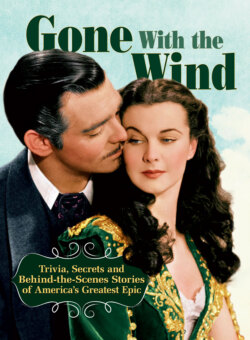Читать книгу Gone With The Wind - Группа авторов - Страница 7
На сайте Литреса книга снята с продажи.
WINNING THE PREMIERE
ОглавлениеOver the next two years, as the search for Scarlett kept movie fans stirred up, Atlantans never lost sight of their goal. Filming on Gone With the Wind finally got under way in January 1939, and the interest in holding the first showing only increased. Thousands of her fellow Atlantans wrote and called Mitchell, certain she was their inside track to getting the premiere to Atlanta. The author patiently reminded them that she had no connection with the movie, and that Selznick, who had just begun to make the film, had not yet officially committed to an Atlanta opening. But that didn’t stop several civic groups from going ahead with their plans for a citywide extravaganza. The Atlanta Junior League discussed holding a costume ball, and the Atlanta Women’s Press Club wanted to host a party for the author and any visiting celebrities.
The bulk of filming on Gone With the Wind was completed by the end of June. The following month, a rumor swept the city that Selznick had decided to open the film in New York. Atlantans were outraged. Fuming Junior Leaguers — “a pack of well dressed Eumenides,” as Mitchell described them — stormed the mayor’s office, demanding that he do something. “They can’t do that to Atlanta,” he declared to the press. “We’ve been expecting the premiere. We’re making plans for it. Atlanta is the logical place. ... In a large sense, the entire story belongs to all of us.”
Hartsfield, true to his word, sprang to the ramparts in full battle gear. He wired Selznick, warning that if the premiere were not held in Atlanta: “DISAPPOINTMENT WOULD BE KEENLY FELT AND THIS PICTURE ABOUT WHICH ALL ATLANTA AND THE SOUTH IS INTERESTED WOULD THEN BE JUST ANOTHER WEEK’S ENTERTAINMENT.”
That night, the city council passed a resolution asking the studio to make a public announcement to put the rumors to rest. The mayor also urged “every civic-minded person” to write or telegram Selznick and MGM “and let them know we really are anxious to have this premiere and that we will be extremely distressed if it goes anywhere else.”
The producer, who knew the South’s approval was vital to the film’s success, moved quickly to squelch the unrest. He fired off a telegram declaring that the mayor’s worries were unfounded, and followed up with a letter in which he noted that neither he nor Loew’s, which was distributing the film, “have ever given any thought to opening in any place but Atlanta.” It is “not merely our intention but our earnest desire” that the film be launched there, he added.
The night before the premiere, the Atlanta Junior League held a Gone With the Wind ball. Guests received an elaborate program featuring a still of Rhett and Scarlett dancing at the bazaar. About 5,000 people attended the event (although at least one gentleman failed to pick up two tickets being held for him at his hotel).
Selznick’s reply was reprinted in the city’s newspapers, and the Atlanta Journal savored the victory: “‘Gone With the Wind’ Premiere Decisively Won for Atlanta: General Selznick Surrenders to Dixie After Mayor Hartsfield Draws His Sword.”
Hartsfield — a tireless civic booster who would serve as mayor for a quarter of a century and after whom the world’s busiest airport is named — sealed the deal the following week by sending a box of magnolia blossoms on a Delta Air Lines flight to Wilbur Kurtz, an Atlanta resident serving as the film’s historian. He encouraged Kurtz to distribute the delicate flowers to cast and crew members as a symbol of Southern hospitality and the city’s eagerness to host their visit.
